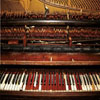 Taking a step away from his singer-songwriter dabblings and harsher noise outputs of Burning Star Core, Yeh's 1975 is a piece of sound art that occasionally flirts with musical elements, but prefers to stay in the realm of abstraction, with a healthy sense of humor to boot. While it might not feel like an album in the traditional sense, the pieces that make up this disc still come together strongly, making for a whole greater than the sum of its parts.
Taking a step away from his singer-songwriter dabblings and harsher noise outputs of Burning Star Core, Yeh's 1975 is a piece of sound art that occasionally flirts with musical elements, but prefers to stay in the realm of abstraction, with a healthy sense of humor to boot. While it might not feel like an album in the traditional sense, the pieces that make up this disc still come together strongly, making for a whole greater than the sum of its parts.
The first half is a series of alternating pieces of droning tones and processed voice, none of which is easily identifiable as far as source material goes:it could be violin, it could be feedback in regard to the drone tracks, who knows.The opening "Drone" is comprised of complex intertwined tones, rising and falling with one another delicately, but forcefully.In its latter moments it becomes more spacious, which sets the stage for the subsequent two drone works.
The second of the drones has a lighter, floating sensibility to it, with the chiming swells being less oppressive than the ones in the preceding track.The third and final drone piece continues this theme, bringing in a drifting variety of tones that never become too overwhelming, ending on an especially somber note.For an artist that often trades in harsh blasts and ugly noise, there is a heavily level of restraint and care put into these works.
Between these are two pieces of voice composition, both made up of cut-up fragments treated with a digital sheen.Besides the fact that the vocals are sliced into microscopic fragments that belie their humanity, there is a hollow, 8 bit digital sample quality that renders them even more synthetic.The second piece sounds comparably more abstract, with the voice snippets both presented in pure scatter-shot chaos, and other times allowed to lock into some sort of monstrous rhythmic structureWhile I enjoy the drone works, here is where Yeh's skills shine.His use of something so simple and omnipresent, the human voice, may not be entirely unique, but his ability in structuring and treating the results is what sets it apart from other similar works.
On the second half of the disc, the two part "Two Guitars," sounds distinctly like one guitar is effected/treated to generate shrill, sustained tones while the other left to be a more textural element.The first piece emphasizes the shrill, often uncomfortable tones, while the latter focuses on the staticy, textured guitar layer.Like his work with just voice, this self-imposed restriction lets Yeh do what he does best:creating a complex composition from a relatively small sonic palette.
The final two pieces do not seem to be built around any specific theme, but stand together strongly on their own to close the disc."Au Revoir…" sounds like a collage of thin, digitally processed synth samples that are occasionally mixed up with booming industrial blasts and wet, messy analog synth outbursts."…Et Bonne Nuit" has the same primary components, but takes on a more deliberate rhythmic structure in comparison, with both pieces ending with the untreated sounds of piano.These pieces feel less limited as far as their source material goes, but even without those self-defined boundaries, the result is a dynamic set of pieces that never get too ambient as to be ignorable, but never go for the jugular with distortion either.
Interspersed in the album are two "skits" that add a distinct levity to a genre that’s usually far too stoic and serious.While "Drips" is simply dripping water, "Shrinkwrap From A Solo Saxophone CD" is just that:rattling plastic wrap captured via microphone.It's untreated and uneffected, and from the title it's obvious what it is, but without that clue, it could be any piece of abstract electronic sound. Compared to his more noise-centric outburst and his last single of actual "music," 1975 is a more abstract and stripped-down work, but one that still clearly shows Yeh's ability to manipulate sound into unique and idiosyncratic shapes.The combination of working quite creatively with limited source material, as well as not taking himself too seriously, makes for a piece of sound art that is compelling without being too sterile or academic.I'm hesitant to call it a "fun" album, but speaking in relative terms, it kind of is.
samples:
 
Read More


